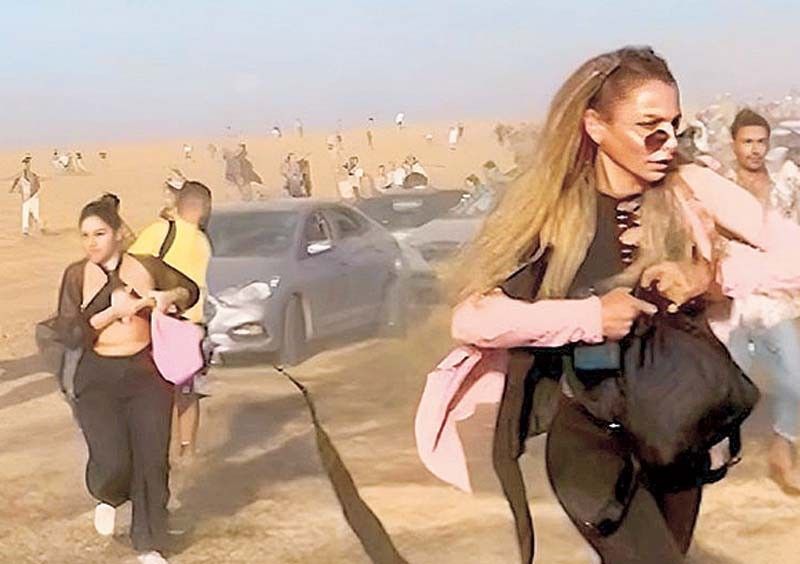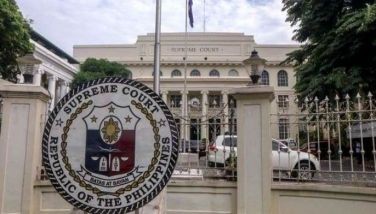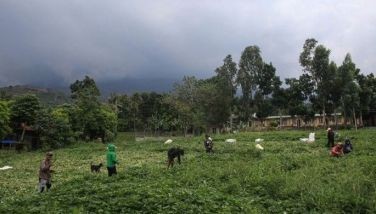Israeli dance party survivors recount attack

BEERSHEBA – The thousands of young Israelis had spent the night dancing at an outdoor rave, many clad in tie-dye T-shirts and crop tops.
But the morning brought with it a massacre.
Just after dawn on Saturday, hundreds of Palestinian militants bulldozed their way through the barricades between Gaza and Israel, drove into scores of Israeli towns along the border and sped through the farmland where the rave was reaching its sunrise climax.
The militants gunned down more than 100 ravers and kidnapped others, as they sprinted through the open fields, according to two senior Israeli officials.
The terrifying attack was just one of the multiple locations hit on Saturday morning by the most coordinated assault inside Israel ever carried by militants. At least 260 bodies would later be found at the festival site, according to Israeli rescue service Zaka.
“In the area where the party took place, and at the party itself, it could be estimated that there were 260 bodies,” said Moti Bukjin, Zaka spokesman, based on the number of trucks that ferried away the corpses.
Video verified by The New York Times showed militants driving off on a motorcycle with an Israeli woman squeezed between them, screaming as her boyfriend was marched off on foot, his arm wrenched behind his back.
Many of those who survived did so by hiding in nearby bushes, some of them for hours.
Bullets whistled overhead and shots resounded all around, recounted Andrey Peairie, 35, one of the survivors. He described crawling up to the top of a nearby hill to get a better sense of what was happening.
“Smoke and flames and gunfire,” said Peairie, a tech worker. “I have a military background, but I never was in a situation like this.”
So began one of the bloodiest weekends in Israeli and Palestinian history, the full details of which started to emerge on Sunday as survivors recounted the most complex and brazen attack on their nation since the 1973 Arab-Israeli war.
About 700 Israelis were killed and at least 150 taken hostage by Palestinian militants, according to a preliminary assessment shared by a senior Israeli military official.
Videos circulated of children and grandparents kidnapped from their homes in Israel and roadsides littered with dead bodies.
The assault, staggering in its scale, prompted a fierce counter-attack from Israel that has killed at least 413 Gazans in missile strikes and gunbattles, according to Gazan health officials.
The violence began familiarly enough – with rocket fire from Gaza, just after dawn.
Amir Tibon and his neighbors in Nahal Oz kibbutz, a village that stands a few hundred meters from Gaza, have become accustomed to frequent rocket fire from militants.
Bomb shelters are installed in every home in the kibbutz, and residents are used to rushing inside them every few weeks.
But soon after Tibon, 35, took shelter on Saturday with his wife and two young daughters, he knew that there was something different about this attack.
The sound of gunfire, then came a morbid realization.
“There were terrorists inside the kibbutz, inside our neighborhood and – at some point – outside our window,” Tibon recalled.
“We could hear them talk. We could hear them run. We could hear them shooting their guns at our house, at our windows.”
On the village WhatsApp group, neighbors were posting frantic messages.
“People were saying, ‘They are in my house, they are trying to break into the safe room!’” recalled Tibon, a journalist for Haaretz, one of the country’s most prominent news outlets.
Messages from fellow reporters revealed even more terrifying news. They said that Hamas, the militant group that controls Gaza, had infiltrated scores of Israeli border towns, and that it would take time for the Israeli army to reach the village.
Not long afterwards, Tibon’s cellphone reception started to break up.
Some 21 km to the east, deep inside Israeli territory, Meitav Hadad and her brother Itamar had no idea Israel had been invaded.
The siblings had switched their phones off for the Jewish Sabbath.
Suddenly, shots rang out in their neighborhood of Ofakim, a small city of 33,000 residents in southern Israel.
Itamar, 22, an off-duty soldier, grabbed his rifle and rushed into the street. Meitav, 18, a student at a religious seminary, followed him.
They expected perhaps a single shooter, the kind of lone-wolf attacker that frequently targets Israeli civilians, Meitav said.
But what they found was far more shocking: a squad of Palestinian militants, armed with rifles and a shoulder-borne rocket launcher, had infiltrated their quiet neighborhood, miles from the border with Gaza.
“We didn’t understand what was happening,” Meitav said.
Terrified, she hid in a playground.
But her brother pressed on, joining forces with two other armed residents, cellphone video showed. He began firing on the militants, hitting two, before his gun jammed, forcing him to take cover, he said.
As he retreated, the militants shot him three times – once in the liver, once in the leg and the third time in the back.
He was losing blood fast, with nowhere to hide.
Desperate for shelter, he began hobbling from house to house, trying to persuade residents to take him inside, Itamar said. No one dared to open up, fearing he was himself a Palestinian fighter.
To make himself seem less menacing, he stashed his gun in a fuse box. Finally, a couple opened their door and hurried him inside. The three of them stemmed his wounds by tearing up his jeans and using the pieces of cloth as a tourniquets, his sister said.
As Israeli security forces began to retake control of the town, two police officers arrived to take Itamar to a hospital. They heaved him back to the street, flagging down a passing car.
By coincidence, the Hadads’ mother, Tali, was in the car.
After he had failed to return home, Hadad broke her observance of the Sabbath and borrowed a neighbor’s car to search for her son. Now, she has rescued him.
- Latest
- Trending






























